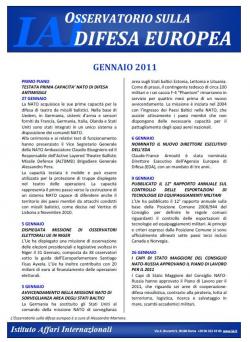Observatory on European Defence, September 2011
IN THE SPOTLIGHT : September 16-18, 2011
NEW CHAIRMAN OF NATO MILITARY COMMITTEE
The NATO Military Committee, chaired by the Italian Admiral Giampaolo Di Paola, took place in Seville, Spain. The meeting was attended by the two NATO strategic commanders, Admiral James Stavridis (Supreme Allied Commander Europe – SACEUR) and General Stephane Abrial (Supreme Allied Commander, Transformation - SACT) and all the Chiefs of Defence of NATO countries. General Knud Bartels, the current Danish Chief of Defence, was unanimously elected new Chairman of NATO Military Committee. Bartles will succeed Admiral Di Paola by January 2012.
September 1-31, 2011
NATO EXTENDS FOR 90 DAYS THE LIBYAN MISSION AND NATIONAL TRANSITIONAL COUNCIL ANNOUNCES A TRANSITION ROADMAP
During September NATO has been continuing the operation “Unified Protector” in Libya. The mission was officially launched according to UN Security Council resolution 1973/2011. On September 21 the North Atlantic Council has decided to extend for additional 90 days the mission in Libya, without changing the mandate. Gaddafi’s loyalists have retreated from Tripoli and are now gathered in Sirte and Bani Walid.
In light of the new Libyan situation, on September 1st the international conference “Friends of Libya” has decided to support the National Transitional Council (NTC) efforts, including to unfreeze 15 billion dollars of Libyan assets. The NTC has announced a roadmap for the election of a Council able to draft a new constitution within eight months, and the presidential elections within twenty months.
September 1-23, 2011
EU CONUCIL REMOVES SOME SANCTIONS AGAINST LIBYA AND STRENGTHENS THOSE AGAINST SYRIA
On September 1, following the Libyan evolutions, EU Council has decided to end the asset freeze of 28 Libyan entities, amending the decision 2011/137/CFSP of February 28, 2011. On September 22 the Council adopted some measures to ease the economic recovery and to support UN mission in Libya, according to UN resolution 2009/2011 of September 16, 2011. The first measures involve the unfreezing of the assets owned by the Central Bank of Libya, Libyan Investment Authority, Libyan Foreign Bank e Libya Africa Investment Portfolio. Other restrictive measures against some oil companies have been removed as well as the flight ban over European airports and air space. On September 2 the Council has further strengthened the sanctions against Syria, due to the country’s internal situation. It was also decided an EU ban on purchase, import or transport of Syrian oil and derivatives. Then the Council has expanded the list of entities subjected to asset freeze and ban of entry in EU. According to the decision 2011/273/CFSP and the regulation 442/2011, further four persons and three companies were added to the list. The asset freeze allows exceptions only for humanitarian aid, while an arms embargo is still in force.
On September 23 the Council has prohibited European investments in Syrian companies involved in oil exploration, production and refining, both in Syria and abroad. The prohibition includes both share acquisitions and the creation of joint ventures, but also granting loans and credits. Finally the Council added two further persons and six companies to the list of entities subjected to asset freeze and visa ban in EU.
September 12, 2011
EU COUNCIL EXTENDS THE MISSIONS IN CONGO AND GEORGIA
The EU General Affairs Council amended the decision 2010/565/CFSP on EU mission in Congo (EUSEC RD Congo), established to assist the reforms in the security sector. The Council has allocated 13.6 million euro for the period October 1, 2011-September 30, 2012. In the meanwhile the Police mission in Congo (EUPOL Congo) has been extended until September 30, 2012, allocating 7.15 million euro. Finally, the Council has extended the monitoring mission in Georgia until September 14, 2012, allocating 23.9 million euro.
September 16, 2011
EU COMMISSION-EDA AGREEMENT ON CBRN RESEARCH
The European Defence Agency (EDA) and the EU Commission signed an agreement on mutual research coordination in chemical, biological, radiological and nuclear (CBRN) field. In the future also the European Space Agency is supposed to join the agreement.
-
Details
Roma, Istituto affari internazionali, 2011, 2p. -
Issue
11/09



